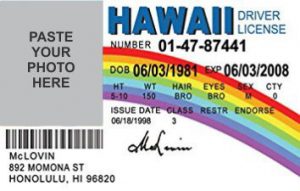In This Episode: Whether you “need” a monkey (wait… what?!) or “want” something for nothing, scammers are eager to take your money from you. Here are a few stories of those who fell for it and (more importantly) how you can reduce your chances of being conned.
023: Why Uncommon Sense Matters
Tweet
How to Subscribe and List of All Episodes
Show Notes

- Help Support Uncommon Sense — yes, $5 helps!
- Links: the Just How Stupid Are You? story of the foolish Korean man, and then the raid (with photos) in Lagos, Nigeria.
- The “bricks” of currency that come out of the U.S. Bureau of Engraving and Printing, as illustrated here, have 1,000 bills in them. So, in the case of $100 bills, each such bundle would be worth $100,000.
- And the pic of the Hawaiian driver’s license the scammer used to paste in a photo and enough details to fake out Mr. Abrego, who is pictured right below that:
Transcript
You probably have an intuitive feel of what I mean when talking about Uncommon Sense — that it is, essentially, common sense taken to the next level. And since you’re listening, you probably agree that the world needs more of it. There are, of course, others who actually disagree, that there’s something to be said for “dumb and happy” — going through life without having to worry about thinking too much. It seems really appealing. And, in fact, there are lots of people who are looking for the “dumb and happy” types.
Welcome to Uncommon Sense, I’m Randy Cassingham.
Actually, there are many people actively looking for the dumb and happy types. Let me tell you a story about a guy who was just the sort of person they were looking for, and the kind of people looking for him. It’s from This is True’s newsletter number 1238. I called it “Monkey Business”:

“I needed a monkey,” says Don Abrego of Wyoming, Mich. “I needed to be different.” He found one online, and sent $400. Then the seller said he needed more money due to a flight delay, and vaccinations. So Abrego sent more money, then more, then more and more. In all, “About 20 Amazon gift cards ranging from a hundred to $400 and $500,” he said. Clerks where he bought the cards “tried to warn me almost every single time,” he admits. “I would say six times out of eight, they were like ‘you’re being scammed. Whatever you’re doing, you’re being scammed’.” Yet he continued to buy and send the cards anyway. He was being scammed. “I would say between $4,500 and $5,000,” he said, and he stepped forward as a way to warn others. He never got the monkey.
And my tagline for the story: “He doesn’t need a monkey: the seller made one out of him already.”
There’s a name for people who are looking for folks just like Abrego, who seems to not have common sense, and definitely doesn’t have Uncommon Sense. And the people who really, truly want to know folks like Abrego are called scammers.
This kind of con is pretty classic. Offer something of value for a low price. Once the mark sends the money, then have an at-least plausible-sounding reasons that more is needed. And more, and more.
Abrego even admits the store clerks were warning him it was a scam. What did he do with that information? He panicked, or the way I usually put it, he reacted first, and thought about it later. He panicked because he realized the clerk might be right, and he’s thrown a lot of money down the drain, and also didn’t get the monkey he “needed”. And throwing more money at the problem helped …how? Of course it didn’t help: all it did was hurt him more.
If he had thought about it after he was $800, $900 in — rather than the $400 he expected — he would have learned the same lesson that ended up costing him $4,500-5,000. If he was thinking, he would have realized that the place to buy a monkey is local, from someone who knows the animal and will make sure you’re compatible with it, not buying some random creature sight unseen. If he had common sense, he would have realized he was being scammed very early. And if he had Uncommon Sense in the first place? Well, he would have realized that a dude in Michigan doesn’t “need” a monkey!
And here’s a funny little detail that didn’t make the cut for the story: Abrego was smart enough to ask the seller, who claimed to be in Hawaii, to send him a copy of their I.D., and he did get a photo of a Hawaiian driver’s license in reply. And, apparently, he then resumed sending the gift cards after that, even though the license’s expiration date showed 2008.
Now here’s where a reporter who has Uncommon Sense comes in. He saw the picture and did a quick Google Image Search on it, and learned it’s simply a badly Photoshopped version of the fake I.D. prop from the movie “Superbad”, a 2007 teen comedy. And just with that description, it took me 10 seconds to find it online: I’ll put a photo of it on the Show Page. It really is “superbad.”
The story didn’t say how old Abrego is, but he did appear on TV to talk about this, and I’ll link to the station’s page that includes the video if you want to watch it, but he strikes me as about 30. Certainly old enough to know better, not someone that’s confused by senility or something, who are the typical scam targets not because they’re stupid, but because they don’t think as quickly as when they were younger, and tend to be more trusting, and less skeptical, because they didn’t grow up in the Internet era.
Anyway, I’ll put his photo — and the photo of the monkey he thought he was getting — on the Show Page. You decide which one is him, and which one’s the monkey.
This is far from the first time I’ve done a This is True story about scams. Usually, it’s the so-called Nigerian Scam, which has the same hallmarks as this one. You get a little money out of someone, and then a little more, and a little more, ramping up the amounts higher and higher.
One of those stories from back in 2012 had a South Korean man actually flying to South Africa to pick up his lottery winnings …even though he hadn’t entered any lottery in South Africa.
I titled that story “Just How Stupid Are You?” Well, here’s how stupid he is: he not only flew to South Africa, he took his daughter with him. How lazy are scammers? This lazy: they sent a taxi to the airport to collect their victims, and not only kidnaped the man and his daughter, but the taxi driver too, and held the Koreans for 10 million U.S. dollars in ransom. The Koreans only got out of it alive and with their bank account intact because the taxi driver escaped and called the police, who then rescued them. That story’s in my blog, and I’ll link to it on the Show Page.
In 2017, I wanted to run a story, but I couldn’t put it in the newsletter because it was guaranteed to trip spam filters. It was about a raid that Nigeria’s Economic and Financial Crimes Commission agents did in Lagos, and it was absolutely astounding how much American cash they found in this apartment. Not just stacks and stacks of $100 bills, but even bricks of $100 bills still in their U.S. Bureau of Engraving and Printing plastic wraps: brand new currency. In all, $43 million in cash — plus some British sterling and Nigerian currency. They provided pictures of what they found, and those are on my blog too. I’ll also link to that on the Show Page.
And when you see the astonishing photographs, just consider this: what’s pictured is merely the pile that they hadn’t gotten around to spending yet! Or otherwise “laundering” into some sort of investment vehicle.
Each of those “bricks” of currency you’ll see on the page come out of the U.S. Bureau of Engraving and Printing with 1,000 bills in them. So, in the case of $100 bills, each such bundle would be worth $100,000. And they have gigantic stacks of them. It’s incredible. And here’s the thing: it’s not at all unusual for the victims’ friends or family or bank to tell these people they’re being scammed. But they’re so greedy and wanting something for nothing — like winnings of a lottery they never entered — that they’re blind to the obvious truth. And every year, hundreds or thousands of people fall for it fresh, and lose millions of dollars. It’s not like this is something new: the Nigerian Scam is so old, they used to troll for their victims by sending faxes. Seriously! Well, the Internet sure did make their jobs easier.
Now think about that just a little: the victims get ensnared because want something for nothing so badly that they throw money at strangers who contacted them for a chance at getting it. Not a very effective realization of “something for nothing,” is it?!
No one is giving away money on the Internet to random obliviots. Not Bill Gates, not a Nigerian “prince”, not some lottery in a foreign country that you haven’t bought a ticket for. It’s a childish fantasy that some celebrity — or even more often, someone you’ve never heard of — has decided that you are so special that they’re going to give you money for no reason. And really, if they ever did decide to do that, they’re not going to need you to send cash to “cover the taxes” or the “shipping” or the vaccination of a monkey.
Now, I know just about all of you get this: you think you don’t need such a warning. Yet my father-in-law, who liked to get online to read the New York Times every morning, at one point something popped up on his screen that malware had been detected on his computer, and he needed to call a toll-free number to renew his anti-malware software.
Of course, they wanted access to his computer to “fix” it (translation: to install actual malware, since his computer really didn’t have any problems), and they wanted his financial information to pay for it. My father-in-law was not a stupid man — far from it. But he didn’t think as fast as he used to, and it sounded plausible, so he actually had his wallet out to give up account access, and had clicked the link the guy gave him, just as his son walked in, and realized what was happening, and quickly yanked the plug out of his computer just in time so that it didn’t load the software.
Of course, the scammer knew that he had failed, so he gave up, right? Wrong: my father-in-law got phone calls daily for weeks from the scammers, knowing they had someone they could fool once, so why not try again? From then to the day he died, my father-in-law refused to answer the phone unless he saw a name he knew on the caller I.D. That was his old Uncommon Sense kicking back in: he knew he was vulnerable, so he made sure the scammers never even had the opportunity to smooth-talk him.
As for Abrego, I hardly even want to draw the lesson here — it’s just so obvious to those who “get it.” Yet Abrego didn’t, and he’s far from unique: he was warned again and again by the clerks who sold him the gift cards. He just didn’t want to believe them, so he sent out more and more money to the scammer. The typical attitude is “I’ve already spent this much, I don’t want to lose it now! I’ll just send another five hundred!” Sorry, it doesn’t work that way.
The so-called “Nigerian Princes” say: “I’m a Nigerian Prince, and I have $12 million in U.S. American cash that I’m trying to smuggle out before I get assassinated by the junta government” or whatever. “And if you help me, I will give you some of this cash! Send money!” Well, if you apply any amount of sense to that, not even Uncommon Sense, you’ll ask yourself a question: why does he need money when there’s a ton of cash or other valuables sitting right there? And the answer is just as obvious: he doesn’t. It’s a scam. If you just want to send someone money, my address is PO Box 666, Ridgway CO 81432.
To wrap this up, I’m sure a lot of you, when hearing the story about Don Abrego and his aborted monkey acquisition, thought he was stupid. He probably actually isn’t. After all, he swallowed his pride and voluntarily went to a reporter to admit he had been conned — as the story said, “he stepped forward as a way to warn others.” That’s a good and noble thing to do: maybe if some of the people who added to that huge stack of cash in Nigeria had done that, the stack wouldn’t have been so damned tall. But when you strive for Uncommon Sense — you work to think first, and react later (if at all) — you’re much less likely to fall for a con.
The Show Page that has the pictures and links I mentioned is at thisistrue.com/podcast22, where you can also comment on how you got conned, or maybe realized in time that something you first thought plausible was a scam after all. I definitely read every single one of them.
I’m Randy Cassingham … and I’ll talk at you later.
Comments Note
Since this is a redo, comments start with those made on the original post — the dates are correct.
– – –
Bad link? Broken image? Other problem on this page? Use the Help button lower right, and thanks.
This page is an example of my style of “Thought-Provoking Entertainment”. This is True is an email newsletter that uses “weird news” as a vehicle to explore the human condition in an entertaining way. If that sounds good, click here to open a subscribe form.
To really support This is True, you’re invited to sign up for a subscription to the much-expanded “Premium” edition:
Q: Why would I want to pay more than the minimum rate?
A: To support the publication to help it thrive and stay online: this kind of support means less future need for price increases (and smaller increases when they do happen), which enables more people to upgrade. This option was requested by existing Premium subscribers.



The monkey scam is extremely common right now, just not with monkeys. Instead with puppies, particularly purebred puppies. Scammers set up fake websites offering puppies for sale, hook people with cute pictures and the ability to “deliver” quickly — a reputable source will take time and have a process other than just charging you money. People want cute and they want it NOW, so they fall for it. The same kinds of things happen again and again: extra cost for this, extra cost for that, got to the airport and now need this. The sad reality is … there is no puppy.
—
Or monkey. Or…. -rc
To my mind the real question is: who is STUPID enough to buy an
ANIMAL
ON-LINE,
SIGHT-UNSEEN???
—
To begin with, Abrego. Then note the comment from Leo in Woodinville. -rc
I refer you to the book “Delete this at Your Peril” by Bob Servant from Scotland. He did a Fine job of Scamming the Scammers. There are a number of stories like this of things he did to get them back. Quite a Hoot!
Where’s the driver’s license?
—
Whoops! Added -rc
Nice rainbow. Maybe that was the clincher?
My sister in law many years back called us and said she won a lottery but needed help in getting money to pay the fees… I told her it was a scam and not to continue. She really wanted the money. I had to show her articles of the same scam till she started to listen.
—
If you didn’t buy a ticket, it’s a scam. -rc
No link on the show page to the kidnapped Korean lottery winner.
—
It is indeed there in the first bullet under Show Notes, as promised. -rc
Had a good friend and VERY smart guy get hit with the kidnapped wife scam. Don’t hang up, go get a wire transfer, etc. Went to next door neighbor, wrote a note on paper said call my wife and her number. Of course she answered and asked what was going on.
A number of factors made him think it was plausible. From the timing to his work travel, all were factors in making a very smart person about to do something really stupid. He was about to go to the back to get the money they were asking for. He too went to the media as a warning to others that this could happen to them.
Yes we do need a reminder, Randy. We need to remember to think and question that which does not sound right. I tell my kids and my aging parents the same thing. If it feels off it probably is. If you are not sure, call me and ask.
—
Good advice. -rc
I won $12 Million in the Publishers Clearinghouse. I only needed to send in $100 to cover the fees. (And, no, they couldn’t take it out of the $12 million.) Having some spare time then, I kept her on the line for about 5 minutes, until I told her I new it was a scam. I got a real cussing out when I convinced her I wasn’t going to send her any money. What surprised me was when she called back a week later, apologized, and said she only did it because her mother died. She needed the money to bury her. I still wouldn’t send money, and “left her mother to rot in the sun.”
—
I’ll bet her mother would be real surprised to learn she had died …in the service of fraud. -rc
Had my first encounter with the Nigerian prince mid 80ies. Was working late when his Telex came and I wondered, why he would send this to a company. Which also told me immediately it was rubbish. Later they switched to Compuserve and eventually the Internet, but the message never changed. Today you find hundreds of thousands of (not only) romance scammers on every dating site and Facebook. Although their strategy is so obvious, there are enough lonesome, elderly ladies out there, who send them money for “love”.
But we have enough real life scammers as well. My “grandson”, which I don’t have, calls out of the blue and needs money. My “friend” has a car accident in Spain and needs money for the hospital. The “police” calls elderly women, the phone even shows the 110 number! They claim that they are observing a gang, who will break into her flat. They ask her to throw her money and jewelry out of the window, where a “policeman” will pick it up and keep it safe for her. You would not believe how many people fall for that trick 🙁 . It is a psychological game, which the bad guys have perfected. And I don’t even want to start about all the daily phishing attempts….
—
Right: the policeman is right outside, but he doesn’t do anything to prevent the “gang” from breaking in?! (But yes, I can see how someone could panic, and don’t doubt for a second that it works some percentage of the time.) -rc
My son, who was just 19 at the time, got hit with a similar scam. He was trying to buy a car, but only had about $1000. There was an ad on Craigslist for someone about 100 miles or so away who (they said) was in the military and was being transferred and had to sell their car quickly at a loss. He did know enough to check out the VIN they gave him, which was to a real car that matched the description, so he thought it was legitimate. He was so proud of himself that he had dealt with buying a car on his own, and so dejected when he realized he had been scammed when nothing came of it. A hard lesson, but at least he is much more aware now.
I knew a man recently who had the “IRS” call and tell him he owed money and he would go back to prison if he didn’t send a wire right away. He panicked, and almost fell for it. He was vulnerable so didn’t recognize a scam until I told him it was a common scam that had been warned about in the paper.
About 20 years ago, before Inet was big, I got a phone call at work saying I had won a Ford truck, boat and trailer, because I had filled out a form at a trade show.
They wanted $800 to ship the prize to me. I was suspicious but the guy on the phone was very genuine answering all my questions. I even asked for his phone # which he gave me. I told him I didn’t have my credit card with me and would I call back.
In Canada we have a police phone # called Fraud Busters, so I called and the police officer told me the callers name and phone #. And that if I paid I would receive a Ford truck, boat and trailer…in the mail! It would be a Tonka brand toy truck with a boat and trailer!
The scam was legal because I would get a ‘Truck, boat and trailer’ for only $800!
A week later the original guy called back, to complain that I hadn’t called to give him my credit card. And also tried to get me to ‘win’ something else!
—
You won all right! By checking it out. -rc
I only read through the podcast quickly, so I may be unclear. When I send money to the address you provided you will send me money or a monkey? Asking for a friend.
—
Of course I’ll send you …a picture of a monkey. But you’ll need to send some more to cover the printing and shipping. -rc
My mother is in her 80s and still pretty darned sharp. Last year she got a call from someone claiming to be a friend of one of her nephews (he had the guy’s name) and the nephew needed help which required money. He was convincing enough that my mom agreed to meet with him and gave him her address.
BUT — as soon as she hung up the phone, her “spidey sense” told her something was wrong. She called the police and explained the story. The police told her to stall him when he got to the lobby of her apartment, then call 911. So she did that and the cops showed up within minutes and nabbed the creep. So now I tell everyone my mom was part of a police sting operation!
—
Love it! -rc